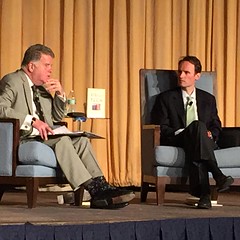 |
| David Ferriero and John Palfrey |
This was the keynote conversation between:
- David Ferriero - Archivist of the U.S. (AOTUS)
- John Palfrey - President of the Board for Digital Public Library of America (DPLA) and author of Biblio TECH; Head of School for Phillips Academy
Although not a librarian (he was a law professor), Palfrey is a fan of libraries. He was director of the Harvard Law School Library. He believes that as citizens, we have the requirement to support libraries. He believes that libraries are at risk because we have forgotten how essential they are.
In lots of communities, there is a feeling of nostalgia around libraries, yet libraries have a huge role ahead of them. The question is what is the library's mission? Can they serve everyone?
He used the phrase "omnivore" to describe those people who want materials in both paper and digital formats.
Digital makes libraries more potent. While we don't know what libraries will be in the future, we need to build the structure so that they will persist and be fabulous. We need to be create the new nostalgia.
Libraries need to do more than that "one" function that is in people's heads.
Libraries need to take time to ask the hard questions about how patrons (clients, users, customers, humans) are looking for and acquiring information.
Palfrey is a fan of human-centered design. Most libraries, museums and archives do that.
Palfrey believes that the digital divide is serious. It is is skills divide. It is a quality of space (where you access broadband) divide. It is a technology divide. It is a quality of broadband divide. Students should not have to go to a noisy coffee shop for Internet access. They should be able to work in a supportive space, where they can work with their fellow students.
Libraries should be a space where things like job creation happens. Libraries can be a natural partner to business incubators.
Ferriero talked about students at Duke taking him and his staff around campus at midnight to show them where students study when the library isn't open. He found it very informative.
We need a design charettes for our digital spaces.
DPLA currently has 1600 contributing institutions, including the National Archives (but not the Library of Congress). They are creating open source data and open source code. Palfrey hopes that the DPLA will be a "rising tide that lifts all boats."
Libraries should inform, engage and delight (fun).
Our flavor of participatory democracy requires libraries. Libraries help those that are the 99% to have the information that they need, in order to participate in democracy.
President Franklin D. Roosevelt established the National Archives. Ferriero said that Roosevelt had a passion for collecting and preserving materials. He asked that his memorial be at the National Archives.
Palfrey believes that teachers are not skilled in teaching digital literacy and are not preparing our children in that area. He believes that this is a natural area for libraries. He believes that school libraries are under appreciated. School libraries require a small amount of capital and the return on investment (ROI) is high.
Ferriero notes that public libraries and school libraries historically have not collaborated well.
If students are turning to their devices to ask reference questions, then libraries need to develop mobile apps to connect students with information.
"The law is a stumbling block on the road to a bright future for libraries." That includes copyright, which needs some reform. The combination of copyright law (Section 109) and contract law is where things get interesting. Ebooks are leased, not owned. He would love to see a contract for an ebook that gives that ebook "owner" the same rights as the owner of a physical book.
Librarians have a huge role in advocating for changes to copyright law, including orphan works legislation. Orphan works legislation would free up many items for use.
Are the current MSLIS programs recruiting and educating the right people for creating the new nostalgia? He believes that the people needed to create the new nostalgia already work in the profession. He said that we need more professional development opportunities.
If everyone works toward our common goals, we will make great strides. There is power to be unleashed.
Phillips Academy has students/applicants from 90 countries, from all different social-economic backgrounds. He has taught a class where they focused on hacking libraries.
Phillips Academy looks for students who are interesting in other people, and not just focused on their selves.
1 comment:
Thanks for your good account. I was interested in David Ferriero's comments during the CILDC session about workforce needs. David elaborated on that, and on the issue of LIS graduate programs and whether they are meeting the needs of the customer, during the IMLS Focus session's concluding remarks later on Tuesday. (John Palfrey introduced David.) In David's view, the employer is the customer, not the student. And many of the graduate programs are not meeting all of his workforce needs in a changing environment. My account of his IMLS Focus session comments, with context on the LIS issue, in this post, “Other-centric,” at my blog.
Maarja Krusten
@nixonara
Post a Comment